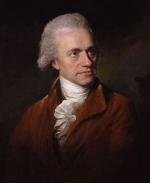Disable ads!
William Herschel
Sir Frederick William Herschel, KH, FRS (German: Friedrich Wilhelm Herschel; 15 November 1738 – 25 August 1822) was a German-born British astronomer, composer, and brother of Caroline Herschel. Born in the Electorate of Hanover, Herschel followed his father into the Military Band of Hanover, before migrating to Great Britain at the age of nineteen. Herschel became interested in astronomy in 1773, and after constructing his first large telescope in 1774, he spent nine years carrying out thorough sky surveys, where his purpose was the investigation of double stars. The resolving power of the Herschel telescopes revealed that the nebulae in the Messier catalogue were clusters of stars: catalogues of nebulae were published in 1802 (2,500 objects) and 1820 (5,000 objects). In the course of an observation on 13 March 1781 he realized that one celestial body he had observed was not a star, but a planet, Uranus. This was the first planet to be discovered since antiquity and Herschel became famous overnight. As a result of this discovery George III appointed him 'Court Astronomer'. He was elected as a Fellow of the Royal Society and grants were provided for the construction of new telescopes. Herschel pioneered the use of astronomical spectrophotometry as a diagnostic tool, using prisms and temperature measuring equipment to measure the wavelength distribution of stellar spectra. Other work included an improved determination of the rotation period of Mars, the discovery that the Martian polar caps vary seasonally, the discovery of Titania and Oberon (moons of Uranus) and Enceladus and Mimas (moons of Saturn). In addition, he was the first person to discover the existence of infrared radiation. Herschel was knighted in 1816. He died in August 1822, and his work was continued by his only son, John Herschel.
 Read more on wikipedia.org Read more on wikipedia.org
 All quotes by William Herschel All quotes by William Herschel
 Edit Edit
|

|
|
|
|
|
Background photo by Giuliana
|